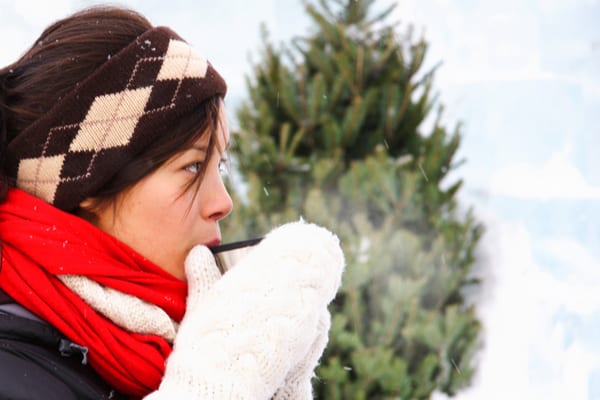Here’s something tailgaters, ice skaters, skiers and other cold weather fans might want to keep in mind: Drinking boozy beverages will make you feel warmer, but it doesn’t actually keep you warm or prevent hypothermia. Instead, drinking alcohol lowers the core temperature of your body.
According to Dr. William Haynes, director of Clinical Pharmacology at the University of Iowa, “Consumption of alcohol undoes many of the human body’s healthy reflexes, one of which is keeping the core body temperature warm in cold weather.” It doesn’t even take that much for this effect to kick in—just one alcoholic drink will start the process that results in a lower
Alcohol causes your blood vessels to dilate, particularly the capillaries just under the surface of your skin. When you have a drink, the volume of blood brought to the skin’s surface increases, making you feel warm. (That dilation is why slightly or exceedingly intoxicated people look flushed.) This overrides one of your body’s defenses against cold temperatures: Constricting your blood vessels, thereby minimizing blood flow to your skin in order to keep your core body temperature up.
Someone enjoying a drink in the cold may feel warmer from the extra blood warming his skin, but that blood will rapidly cool thanks to the chill in the air. Plus, the warmth caused by blood rushing to the skin will also make him sweat, decreasing his core temperature even further. The rapid drop often occurs without the drinker realizing it, because his skin will still feel fairly warm, which makes it doubly dangerous to drink alcohol in extremely cold weather. (You might want to put down the coffee, too; caffeine has a similar effect.)
This isn’t the only bad thing about drinking alcohol in the cold. According to the Army Research Institute of Environmental Medicine, drinking alcohol in chilly weather also reduces the body’s ability and tendency to shiver, taking away yet another method your body uses to help keep warm when it is cold.
Bottom line? The age-old practice of imbibing those Hot Toddy’s in the ski lodge to keep the body warm in cold weather is the exact opposite of what you should do.
Which means that Coffee, either Iced or Hot, can keep you toasty on cold mornings and is the Winner of this challenge! While it may seem counterintuitive, it’s not the hot temperature of the coffee that warms you, it’s the caffeine. “Caffeine increases metabolism by stimulating the release of fatty acids from the body’s fat tissues, which in turn can increase body temperature,” explains Minchen. Bonus: Add low-fat, Vitamin D-fortified milk to your morning cup. A 2011 Clinical Nutrition study found the nutrients increase diet induced thermogenesis (the process of converting calories to heat).
“You can have your coffee hot or cold any day of the year,” says certified nutritionist Karin Adoni Ben-David. “Drinking iced coffee during cold days won’t make you sick and won’t contribute to a cold,” she says. “While hot beverages and foods, like tea or soup, are helpful in loosening congestion and soothing a sore throat, cold beverages will not, in turn, make your throat more sore.”
And don’t twist this intel to mean hot drinks are actually health-boosting miracle workers. “Drinking a cup of hot tea or coffee won’t do much to raise your core body temperature in cold weather,” Ben-David says. “It will briefly warm up your hands, mouth, and stomach, and give you a warm, pleasant feeling. But it won’t have much of an effect on the rest of your body or affect your health in any way.”
Bottom Line? Coffee makes you feel warmer from the inside out. Whether hot or cold, the caffeine increases your metabolism and raises your body temperature.
—
Photo Credit: Maridav / Shutterstock.com
